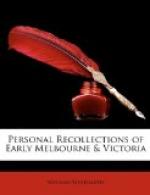EARLY CIVILIZING DIFFICULTIES.
“He loves his own barn better
Than he loves our house.”
—First Part Henry IV.
Up to that time, and for some time longer, the religious conversion of these natives was regarded as hopeless, so deeply “bred in blood and bone” was aboriginal character. Consequently all the earlier missions were abandoned in utter despair, with only one exception, that of the Moravians, which, in faith and duty continuing the work, was at length rewarded with success. Naturally some few, especially amongst the young, were less severely “native” than the rest, and these were more or less gained. But the change came with the next generation, “born in the purple” of surrounding colonial life. The blood and bone had been partially neutralized, and this is still more the result of yet another generation that has followed, so that, in spite of the black skin, the missionary now deals with natures much more amenable to his teachings.
A remarkable illustration of aboriginal tenacity, which, however, I am quoting only from memory, occurred in South Australia. Two aboriginal children, separated from babyhood from aboriginal life, were trained and educated like colonists. For the earlier years little difference was noticed, but as they advanced into boyhood some restlessness became evident. When, on one occasion, a native tribe, presumably their own, happened to be near Adelaide, these children, who had either seen them or heard of them, made their escape at the earliest opportunity, and, having reached the native camp, at once threw off the habiliments of civilization, and never after showed any disposition to return to the conditions they had so summarily rejected.
“The beach” (Now Port Melbourne).
“Thinking of the days that are no more.”
—Tennyson.
At the time of my arrival, all Melbourne-bound passengers were put out by their respective ships’ boats upon that part of the northern beach of Port Phillip that was nearest to Melbourne, whence, in straggling lines, as they best could in hot winds, they trod a bush track of their own making, which, about a mile and a half long, brought them to a punt or little boat just above “The Falls,” where the owner made a good living at 3 pence a head for the half-minute’s passage. This debarkation place got to be called, par excellence, “The Beach.” It consisted already of two public-houses, kept respectively by Liardet and Lingham. Both




